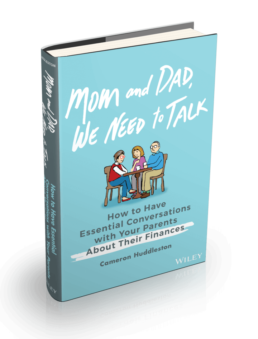Even though I am a financial journalist, I have made my fair share of money mistakes. Unfortunately, my biggest slip-up is one that really shouldn’t have happened – especially because I had been writing about personal finance for so long that I should’ve known better than to let it happen. Let me explain, as my 7-year-old son would say, by using a dramatic flashback.
In 2003, I moved back to my home state of Kentucky from Washington, D.C., where I had been working for Kiplinger.com – the website of Kipliner’s Personal Finance magazine. I had written a few articles about long-term care insurance, so one of the first things I told my mom when I moved back was that she should look into getting a policy. Because she was living on her own, I knew it would be helpful to have insurance that would help cover the cost of long-term care if she ever needed it.
She took my advice and met with an insurance agent. Unfortunately, a pre-existing condition she had – a benign tumor called an acoustic neuroma – made her too much of a risk to insure. So she was denied coverage. When she told me the news, this is when I made a mistake that I still regret: I did nothing.
You’re probably wondering what I could have done. I should’ve taken that opportunity to start talking to her about her finances. I should have said, “Mom, let’s sit down and figure out how you’ll pay for long-term care if you ever need it. Let’s look at your financial accounts, see what assets you have, discuss what sort of care you would want and develop a plan.” But I didn’t. I can’t believe it didn’t even occur to me – someone who doled out financial advice – to have this conversation.
Why Not Talking to My Mom About Her Finances Was a Mistake
The thing is, it doesn’t occur to most adult children that they should have money talks with their parents. A survey by the personal finance website that I’m now a columnist for – GOBankingRates — found that 73% of adults haven’t had detailed conversations with their parents about their finances. The most common reason respondents said they haven’t had this conversation is because it didn’t seem like an important topic to discuss.
I can’t emphasize enough how important it is to talk to your parents about their finances sooner rather than later. Let me say it again so it sinks in: You need to talk to your parents about their finances sooner rather than later. This is a conversation that can’t wait.
Within a couple of years after my mom was denied long-term care coverage, she started showing signs of memory loss. I recognized the need for having a conversation then. But I was afraid – not of talking to my mom about her finances but of saying that we needed to have a conversation because she was starting to forget things. I didn’t want to be the one to tell her that she was losing her memory.
But it got to the point where I couldn’t wait any longer. I knew she needed to update her legal documents – will, power of attorney and living will – before her dementia progressed too far. You can’t sign these documents if you are no longer competent. So I insisted that we meet with an attorney to draft these documents – especially a power of attorney document that named me and my sister as her powers of attorney to make financial decisions for her once she no longer was able to do so on her own.
Without that document, I wouldn’t have been able to step in and start managing her finances for her as her dementia progressed without going through lengthy and expensive court proceedings to be named her conservator. Basically, I would’ve been putting her on trial to prove she was incompetent. I know someone who had to do this with his father because his father hadn’t named him power of attorney before Alzheimer’s disease left him unable to manage his finances. My friend spent nine months and $10,000 going through the legal process to become his dad’s conservator. He admits now that he could’ve avoided that if he had only had a conversation with his dad about his finances and what sort of legal documents he had or didn’t have.
I’m glad I acted fast enough to arrange a meeting for my mom with an attorney. But because I had waited to get details about my mom’s finances until she really needed help, I had a bigger problem. I had to gather information from someone who was having trouble remembering things. It was like trying to put together a puzzle without knowing what the final picture was supposed to be.
Because she no longer had a firm grasp of where all of her money was, one of her accounts slipped under my radar. I didn’t find out she had $50,000 worth of investments until a notice arrived that her account was about to be turned over to the state treasury department. That was only a couple of years ago, and my mom already was in an assisted living facility. Fortunately, I was able to get the money (because I have power of attorney) and use it to pay for almost a year’s worth of care.
Don’t Make the Same Mistake I Made
A survey by Fidelity Investments found that nearly 40% of adult children think conversations about their parents’ finances don’t need to happen until after their parents have retired and their health or finances have become an issue. I understand why so many of us think this conversation can wait. We assume that it’s going to be awkward. So why force it unless it’s absolutely necessary?
The problem with waiting until a health crisis makes it necessary to talk to your parents is that it might be too late at that point for you to help. You might not have the legal right to access their accounts to ensure their bills get paid or to make health care decisions for them if they haven’t named you their financial or health care power of attorney. Then you’ll have to go to court and spend thousands of dollars to be named their conservator.
If you wait until your parents show signs that they need financial help, you might not have taken steps to get your own finances in order to provide that help. And if you wait until your parents actually need long-term care before you start talking about it, you might find out that you’re their long-term care plan. That means you might have move them into your house and stop working to care for them.
And if you never take the time to find out whether your parents have wills, you might discover when they die that they didn’t (half of adults don’t). Every estate planning attorney I know has tales of families that got along until a parent died without a will. Usually, the fights that followed could have been prevented if the kids had asked their parents to put their final wishes in writing.
No matter how awkward it might seem to ask your parents to talk with you about their finances, it will be even more awkward if you don’t have the conversation and any of these scenarios I just laid out happen to you. Trust me, I know.
If you need help starting the conversation with your parents and figuring out what sort of information to gather from them, check out my new book – Mom and Dad, We Need to Talk: How to Have Essential Conversations With Your Parents About Their Finances. It will walk you through the process step-by-step so you can avoid making the mistake of waiting until it’s almost too late talk to your parents as I did.
Don't Miss Out! ORDER NOW!
"An excellent step-by-step guide to navigate what can be time-consuming, uncomfortable conversations."
- Michelle Singletary, The Washington Post
Related Posts
April 23, 2019
5 Smart Money Moves Stay-at-Home Parents Should Make
Parents who leave the workforce to…

Cameron Huddleston
I am the author of Mom and Dad, We Need to Talk: How to Have Essential Conversations With Your Parents About Their Finances. I also am an award-winning journalist with 20 years of experience writing about personal finance. My work has appeared in Kiplinger’s Personal Finance, Forbes.com, Yahoo!, MSN, and other online and print publications.





[…] One of my biggest regrets is not talking to her about money matters before she started losing her memory. Even though I am a financial journalist, I just didn’t realize how important it was to have that conversation. […]